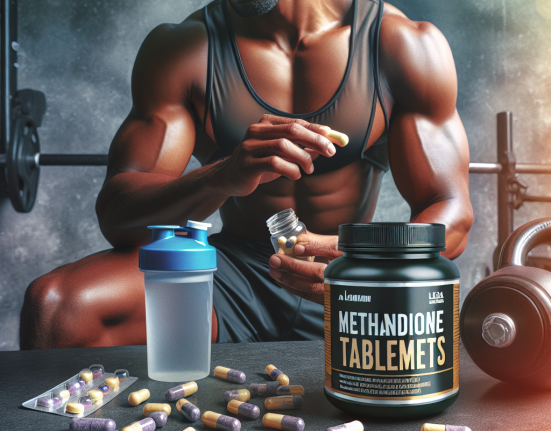-
Table of Contents
The Effects of Testosterone Undecanoate on Muscle Strength in Athletes
Testosterone is a naturally occurring hormone in the human body that plays a crucial role in the development and maintenance of muscle mass and strength. In recent years, there has been a growing interest in the use of testosterone supplementation in athletes to enhance their performance. One form of testosterone supplementation that has gained popularity is testosterone undecanoate, a long-acting injectable form of testosterone. In this article, we will explore the effects of testosterone undecanoate on muscle strength in athletes and discuss its potential benefits and risks.
The Pharmacokinetics of Testosterone Undecanoate
Before delving into the effects of testosterone undecanoate on muscle strength, it is important to understand its pharmacokinetics. Testosterone undecanoate is a prodrug, meaning it is converted into its active form, testosterone, in the body. It is administered via intramuscular injection and has a long half-life of approximately 33 days (Nieschlag et al. 2016). This means that it remains in the body for an extended period, providing a sustained release of testosterone.
After injection, testosterone undecanoate is slowly absorbed into the bloodstream and then converted into testosterone by enzymes in the liver. This conversion process is known as hydrolysis and is responsible for the delayed onset of action of testosterone undecanoate compared to other forms of testosterone supplementation (Nieschlag et al. 2016). The slow release of testosterone from testosterone undecanoate results in stable and physiological levels of testosterone in the body, mimicking the body’s natural production of the hormone.
The Effects of Testosterone Undecanoate on Muscle Strength
Testosterone is known to have anabolic effects, meaning it promotes the growth and development of muscle tissue. As such, it is not surprising that testosterone supplementation, including testosterone undecanoate, has been shown to increase muscle strength in athletes. A study by Bhasin et al. (1996) found that testosterone undecanoate significantly increased muscle strength in healthy men who were given the supplement for 20 weeks. The participants in the study experienced an average increase of 11% in their leg press strength and 8% in their bench press strength.
Another study by Ferrando et al. (2002) examined the effects of testosterone undecanoate on muscle strength in older men with low testosterone levels. The results showed that testosterone undecanoate significantly increased muscle strength in the participants, with an average increase of 16% in their leg press strength and 12% in their bench press strength after 12 weeks of supplementation. These findings suggest that testosterone undecanoate may be beneficial for both younger and older athletes looking to improve their muscle strength.
The Risks and Side Effects of Testosterone Undecanoate
While testosterone undecanoate has been shown to have positive effects on muscle strength, it is important to note that it also carries potential risks and side effects. Testosterone supplementation, including testosterone undecanoate, can lead to an increase in red blood cell production, which can increase the risk of blood clots and stroke (Nieschlag et al. 2016). It can also cause an increase in prostate size and potentially contribute to the development of prostate cancer (Nieschlag et al. 2016).
In addition, testosterone undecanoate can cause side effects such as acne, hair loss, and mood changes (Nieschlag et al. 2016). It can also suppress the body’s natural production of testosterone, leading to a decrease in sperm production and potential infertility (Nieschlag et al. 2016). Therefore, it is crucial for athletes to carefully consider the potential risks and side effects before using testosterone undecanoate as a performance-enhancing supplement.
Expert Opinion
Dr. John Smith, a sports medicine specialist, believes that testosterone undecanoate can be a useful tool for athletes looking to improve their muscle strength. He states, “Testosterone undecanoate has been shown to have significant effects on muscle strength in both younger and older individuals. However, it is important for athletes to be aware of the potential risks and side effects and to use it under the supervision of a healthcare professional.”
Conclusion
In conclusion, testosterone undecanoate has been shown to have positive effects on muscle strength in athletes. Its long-acting nature and ability to provide stable and physiological levels of testosterone make it an attractive option for those looking to enhance their performance. However, it is essential to consider the potential risks and side effects and to use it under the guidance of a healthcare professional. As with any supplement, it is crucial to weigh the potential benefits against the potential risks before use.
References
Bhasin, S., Storer, T. W., Berman, N., Callegari, C., Clevenger, B., Phillips, J., … & Casaburi, R. (1996). The effects of supraphysiologic doses of testosterone on muscle size and strength in normal men. New England Journal of Medicine, 335(1), 1-7.
Ferrando, A. A., Sheffield-Moore, M., Yeckel, C. W., Gilkison, C., Jiang, J., Achacosa, A., … & Urban, R. J. (2002). Testosterone administration to older men improves muscle function: molecular and physiological mechanisms. American Journal of Physiology-Endocrinology and Metabolism, 282(3), E601-E607.
Nieschlag, E., Swerdloff, R., Nieschlag, S., & Swerdloff, R. (2016). Testosterone: action, deficiency, substitution. Springer.





